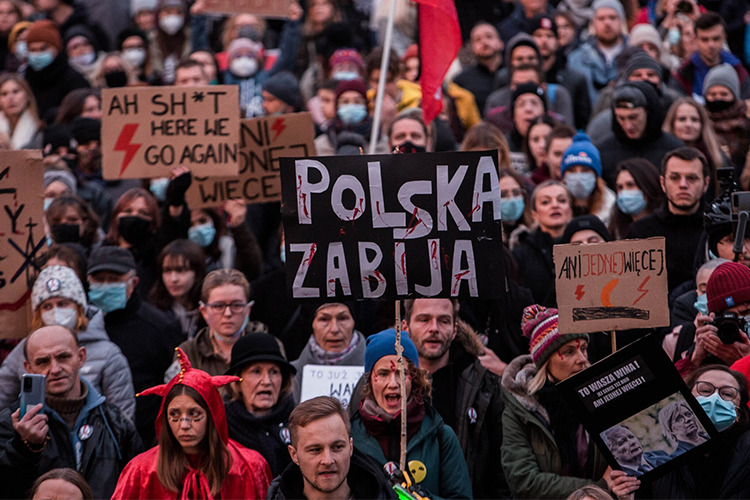
Debate about abortion rights continues internationally as people from the Netherlands protest for women’s rights. photo by Adrianna Bochenek
The United States seems to be an outlier amongst developed countries with their policies on abortion, leading to questions about the history of this country’s treatment of women.
On June 24, 2022, outrage and protests erupted across the country. The reversal of the landmark Supreme Court case Roe v. Wade, which gave women autonomy over their own bodies, took away federally protected reproductive rights. Women had been fighting to keep those rights for nearly 50 years, raising questions about the history and now future of the country’s treatment of women.
For a country that claims to be the “Land of the Free,” the rights of women throughout history have been restrained by so many prejudices and biases towards them. The idea that women simply can not do as much as men can has been evident in the lack of progress for women in policies and laws passed over the years. The country was founded in 1776, and women only gained the right to vote in 1919. The suffrage movement had been going on for over 70 years before women finally were able to vote. 70 years for women’s voices to even be heard- 70 years to gain the right that white, landowning men were given immediately. The unequal distribution of power continues even today with the pay gap between men and women. Women today make, on average, 17% less than men do. Additionally, in 2021, only 41 of the Fortune 500 CEOs were female, and 459 were male. Women have been so clearly oppressed throughout history and have continued to be today, so one can only imagine the outrage that erupted across the country when the Supreme Court overruled their decision that state restriction of abortion was unconstitutional. Women in certain states where “trigger laws” were in effect suddenly no longer had control over their own bodies. Abruptly, the decision on whether or not they could choose to give birth or not was taken away, and women were forced back into the same position they were in before Roe v. Wade was initially approved in 1973- back to square one.
Women in some other countries, however, are not faced with the same issues; abortion is legal in all states and territories in Australia. Naturally, the news of Roe v. Wade being overturned shocked not only Americans, but the rest of the world as well. Australians attended rallies and protests in masses, hoping to show their support for women in America and the fight to gain their rights back. The Australian Government even denied a visa to Troy Newman, an American pro-life activist, referring to him as an anti-choice extremest and saying that his presence would incite violence against doctors and threaten Australians. One extremely interesting thing to consider, though, is that in Australia, there were never many reports of harassment or threats to women that had received or were looking to receive an abortion. In the words of Helen Jones, one Australian woman who recently moved to America and has experienced both atmospheres and attitudes towards abortion, “The majority of Australians believe abortion is a private personal matter, so abortion violence is very rare in Australia.” In America, however, even before abortion was criminalized at the state level, reports of assault and battery as well as death threats, attempted arson, and downright harrassment relating to abortion all occurred.
Abortion is not simply an issue of religious beliefs – it’s an issue of safety. Mortality rates of women are predicted to increase by at least 20% due to the criminalization of abortions. The reality is, abortions are going to happen regardless of the laws in place regulating them – there’s just going to be a much higher mortality rate for the women that are desperate to get one. Women of color are also exponentially more likely to suffer the consequences of abortion bans – nearly 40% of women that get abortions in the United States are black. Abortion bans like the ones recently instilled in Texas will increase their health and financial risks. So not only does it seem like this country is waging war against women – it seems as though this country is waging war against anyone that is not a white male.
So what is the true purpose of the Supreme Court’s new decision? Is it truly to “protect unborn babies,” or is it to force women and minorities back into the same cycle of oppression and violence as this country has explored for centuries?
That’s something that needs to be considered.